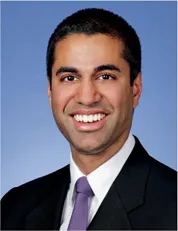Ajit Pai '97: Public Service Excellence Stems From Law School Culture

Late last year Ajit Pai, ’97, was nominated to be one of the five commissioners of the Federal Communications Commission (FCC). Until April of 2011, he had served in the FCC general counsel’s office for nearly four years, first as associate general counsel, then as deputy general counsel (with supervisory responsibility for more than 40 lawyers), and finally as special assistant to the general counsel.
Aside from about two years at Verizon and a recent stint at Jenner and Block before his FCC appointment, Pai’s entire career has been in federal government positions. “I didn’t really plan on a public service career when I was coming out of law school,” he says, “but once I got into one, I found the work very engaging.” He moved to Washington following a conversation about career options with District Court Judge Martin Feldman, for whom he clerked after graduation. Pai told Feldman that he had greatly enjoyed studying antitrust law at the Law School, and the judge recommended that Pai should consider a job with the Justice Department’s antitrust division. Pai landed a position there, with the telecommunications task force, where he noticed that the telecom part of his work was as engaging for him as the antitrust part. Among other things, he worked on what was then the largest merger in US history, between Sprint and WorldCom.
After that job, he held three other high-level government positions: as deputy chief counsel to the Senate Judiciary Committee’s Subcommittee on Administrative Oversight and the Courts; as senior counsel at the Justice Department’s Office of Legal Policy; and as chief counsel to the Senate Judiciary Committee’s Subcommittee on the Constitution, Civil Rights, and Property Rights. His responsibilities in those positions ranged from the review of proposed legislation to serving as lead counsel for the Supreme Court nominations of John Roberts and Samuel Alito, and his work touched on matters of national security, constitutional law, Internet regulation, judicial administration, and civil liberties, in addition to a variety of telecom issues.
Pai says that his experience at the Law School—where he won the Thomas R. Mulroy Prize for Excellence in Appellate Advocacy—was crucial for the steady advances that have marked his career: “A strong foundation in the nuts and bolts of legal analysis has been essential for me in handling such diverse responsibilities, and I’ve also benefited from the deep awareness that comes with a Chicago education of the power of incentives. Just as important in the environments where I have been working, I have appreciated the Law School’s culture of open, good-spirited debate inside and outside the classroom. Very often during my career I have been thankful to the Law School for reinforcing the importance of receptiveness to others’ points of view—to listening, learning, and understanding as being critical to achieving the best outcome. I have tried to be true to those values in everything I do.”
The son of two doctors who came to the United States from India shortly before he was born, Pai grew up in Parsons, Kansas, a town near the state’s borders with Missouri and Oklahoma. “My parents looked around for a long time before they decided where they wanted to settle down,” he says. “They wanted a good place to bring up their children, and a place where they could be of service to people who needed their help. The small-town values of Parsons were wonderful, and maybe some of my parents’ commitment to service rubbed off on me. Initially, they were disappointed that I didn’t become a doctor myself, but they’ve certainly come to appreciate my career choice.” He may also have assuaged their concerns when he married a physician, Janine Van Lancker, who is now an assistant professor at the George Washington University Medical Center. Their son, Alexander, was born last August.
At press time, Pai was still awaiting Congressional action on his nomination to the FCC. With any luck, the next phase of his career in public service will soon begin.
Editor’s Note: On May 7, the Senate confirmed Pai as a commissioner; additional coverage here.


